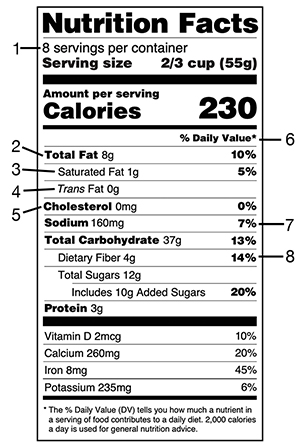
In my last blog post, I received a question about how to reduce sugar intake without feeling deprived. I would like to address some of the effective strategies to reduce sugar intake without feeling deprived here in this article.
If you’re looking to improve your diet, reducing sugar intake is a commendable starting point. An excess of sugar, although tempting for our taste buds, is a well-known culprit behind numerous health problems, such as weight gain, type 2 diabetes, and heart disease. But it’s not just about cutting out the obvious sweets; it’s about understanding and managing a pervasive ingredient in our diets.
Recent data reveals a striking contrast between recommended sugar intake limits and the actual amounts consumed by the average person. Dietary guidelines generally suggest that added sugars should not exceed 10% of total daily calories, yet many of us are unknowingly surpassing this limit due to hidden sugars in processed foods.
The challenge in reducing sugar isn’t merely a physical one; it’s psychological. Sugar triggers pleasure centers in the brain, leading to a ‘reward’ feeling that can be hard to resist. When people attempt to eliminate sugar abruptly, they often contend with a sense of deprivation that can derail their efforts.
Nevertheless, the goal isn’t to eliminate all joy in eating but to find a balance that fosters both health and satisfaction. By becoming informed consumers and making conscious choices, it’s possible to cut back on sugar without a feeling of missing out. In the next section, we’ll explore how to uncover hidden sugars in everyday foods, which is a vital step in this sugar-reduction journey.
Identifying Hidden Sugars in Everyday Foods
Sugar isn’t always straightforward. It can hide under various names on ingredient lists, making it trickier for you to recognize. I’ve learned through experience that scrutinizing food labels is essential. When you do, you’ll often find sugar listed as high fructose corn syrup, cane crystals, or even dextrose.
You’d expect certain foods like candies and sodas to be full of sugar, but it’s the ‘health foods’ that can be deceptive. For example, that flavored yogurt you love? It could have almost as much sugar as a candy bar. And those sports drinks, granola bars, and cereals that boast ‘energy-boosting’ attributes? They can be culprits too.
Beyond the label, marketing strategies can influence your perception of how healthy a product is. Words like ‘natural’ and ‘organic’ can be misleading. It’s easy to assume they mean ‘low in sugar,’ which isn’t always the case. You need to look past the buzzwords and focus on the facts behind them – specifically the Nutrition Facts label and the ingredients list.
Why not start reading those labels today? Begin with something you consume regularly. You could be surprised at what you find. And as you get the hang of it, making more informed choices becomes a breeze.
Balanced Alternatives to Sugar-Laden Snacks
There’s good news if you’re watching your sugar intake—sacrificing sweetness isn’t necessary for a healthier diet. By choosing balanced alternatives wisely, you can enjoy treats without the guilt. Here’s how you can satisfy your sweet tooth with smarter choices:
ACCEPT that fruits are your friends. Natural sugars found in fruits come with fiber, vitamins, and antioxidants. So instead of reaching for a candy bar, try a ripe peach or a bowl of berries.
EXPLORE the world of natural sweeteners. Items like stevia, monk fruit, and pureed dates can sweeten your food without the spike in blood sugar levels.
CREATIVITY is your greatest asset in the kitchen. Modify your favorite dessert recipes by reducing the sugar and adding spices like cinnamon or vanilla to enhance sweetness perception.
REMEMBER, this isn’t about cutting out all the fun. It’s about finding a balance that maintains the joy of eating while supporting your health.
Building Sustainable Habits for Long-Term Success
I understand that making any dietary change can be challenging, and it’s crucial to ensure that these changes stick in the long run. This section will guide you through establishing habits that you can maintain over time, without feeling a sense of deprivation or loss.
First, I advise setting realistic goals. Instead of eliminating all sugar overnight, start by cutting back on certain items each week. Maybe swap out your regular soda for a seltzer with a splash of juice. Small wins can build the confidence needed for bigger challenges.
It’s also essential to practice mindful eating. This means paying close attention to what and why you’re eating. Am I hungry, bored, or stressed? By being more conscious of your triggers for sugar consumption, you can better manage and eventually reduce your intake.
Focus on whole, unprocessed foods. These typically contain less added sugar compared to packaged and processed alternatives. Fresh fruits can be a satisfying and naturally sweet option.
Stay hydrated. Drinking plenty of water can help reduce cravings for sugary beverages and snacks. Additionally, dehydration can sometimes be mistaken for hunger.
Don’t underestimate the power of community and peer support. Sharing your goals with friends or joining a group with similar objectives can provide motivation and accountability. Plus, it’s more fun to celebrate your milestones with others who understand your journey.
Lastly, always remember that this is a process, and patience is key. If you indulge in a sugary treat, don’t beat yourself up. Acknowledge it, learn from the experience, and keep moving forward. Every day is a new opportunity to make healthier choices.
Kindly feel free to comment, and send me any questions on this important topic. Stay healthy.


Your article on reducing sugar intake is incredibly informative and practical. I appreciate the variety of strategies you’ve provided, from mindful eating to gradual reduction. Have you personally tried any of these techniques, and if so, which ones have been most effective for you? I’ve found that swapping sugary snacks for healthier alternatives like fruits or nuts has helped me curb cravings without feeling deprived.
Your emphasis on reading labels and being aware of hidden sugars is crucial. It’s surprising how many processed foods contain added sugars. Have you encountered any surprising sources of hidden sugars in your own journey? Personally, I was shocked to discover how much sugar was hiding in seemingly “healthy” granola bars. Thank you for sharing these effective strategies for a healthier lifestyle!
Hi Pasindu, thank you for your kind words about my article on reducing sugar intake without feeling deprived. I’m glad you found the strategies helpful, and it’s fantastic to hear that swapping sugary snacks for healthier alternatives has been effective for you.
As for my personal experience with these techniques, yes, I’ve tried many of them. I’ve found that mindful eating and gradual reduction have been particularly effective for me. By paying closer attention to my body’s hunger and fullness cues, I’ve been able to better manage my cravings and make healthier choices overall. Gradually reducing my sugar intake instead of going cold turkey has also helped me avoid feeling deprived and made the transition more sustainable.
Regarding hidden sugars, I’ve certainly encountered some surprises along the way. Like you, I was shocked to discover the amount of sugar lurking in seemingly “healthy” granola bars and other packaged products labelled ‘Organic.’ The importance of reading labels carefully and being aware of the various names that sugar can hide under, such as high fructose corn syrup, dextrose, and maltose cannot be overemphasized.
Thank you for sharing your own experiences, and I’m glad you found the article helpful. It’s always rewarding to hear how these strategies are making a positive impact on others’ lives. If you ever have any more questions or need further guidance, feel free to reach out. Here’s to continued success on our journeys toward healthier lifestyles!
Hey Tinu,
Your article provides helpful tips for leading a healthier lifestyle when cutting back on sugar without feeling deprived. Interestingly, rather than advocating for severe dietary changes, the focus is on discovering hidden sugars and making balanced nutritional adjustments. And this raises some questions: How can someone avoid feeling left out in social settings where sugary foods are common? What are some methods for addressing sweet tooth cravings during stressful times or depressed moods about emotional eating to maintain these long-term healthy habits? It is a discussion worth having for anyone hoping to make sustainable dietary improvements.
Hey Sara, thank you for your insightful feedback on my article. I’m glad you found the tips helpful and appreciated the focus on balanced nutritional adjustments rather than drastic dietary changes.
Navigating social settings where sugary foods are common can indeed be challenging, but it’s entirely possible to enjoy these occasions without feeling left out. One strategy is to plan ahead by bringing your own healthier alternatives to share, such as fruit platters, veggie trays, or homemade treats made with natural sweeteners. Additionally, focusing on the social aspect of gatherings rather than solely on the food can help shift the focus away from sugary temptations.
Addressing sweet tooth cravings during stressful times or emotional eating episodes requires a combination of mindfulness and healthy coping mechanisms. Instead of turning to sugary snacks for comfort, try incorporating stress-relief techniques such as deep breathing exercises, meditation, or engaging in physical activity to release endorphins and boost mood naturally. Finding alternative ways to satisfy cravings, such as indulging in a piece of dark chocolate or enjoying a small serving of naturally sweet fruit, can also help curb sugar cravings without derailing your healthy habits.
It’s important to remember that making sustainable dietary improvements is a journey, and it’s okay to have occasional setbacks or moments of indulgence. The key is to focus on progress rather than perfection and to approach each day with a mindset of balance and moderation.
Thank you for raising these important questions, and I’m glad we’re having this discussion about how to maintain long-term healthy habits in the face of social pressures and emotional triggers. Kindly check back on my next article where I’m going to address this comprehensively. If you have any further questions or need additional support on your journey to a healthier lifestyle, feel free to reach out. Here’s to making sustainable dietary improvements and embracing a healthier, happier life!
Shalom.